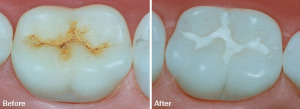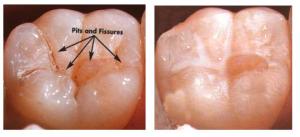What are pit and fissure sealants?
Sometimes brushing is not enough, especially when it comes to those hard-to-reach spots in your mouth. It is difficult for your toothbrush to get in between the small cracks and grooves on your teeth. If left alone, those tiny areas can develop tooth decay.Pit and fissure sealants give your teeth extra protection against decay and help prevent cavities.
Dental sealants are a plastic resin that bonds and hardens in the deep grooves on your tooth’s surface and it is usually applied to the biting surfaces of the back teeth.

How do sealants work?
The sealant forms a hard shield that stops food and bacteria getting into the tiny grooves in the teeth, the tiny grooves become smooth and are less likely to harbor plaque there by tooth decay is prevented . With sealants, brushing your teeth becomes easier and more effective.
Which teeth should be sealed?
Sealants are only applied to the back teeth – the molars and premolars. These are the teeth that have pits and fissures on their biting surfaces. Your dentist will tell you which teeth should be sealed after examining them, and checking whether the fissures are deep enough for sealing to help. Some teeth naturally form with deep grooves which can be sealed, others form with shallow ones which may not need sealing.
When should this be done?
Sealants are typically applied to children’s teeth as a preventive measure after the permanent teeth have erupted as a way to prevent tooth decay.This is usually between 6 and 7 years of age. The rest are usually sealed as soon as they appear, which can be any time between 11 and 14.However, adults can also receive sealants on healthy teeth. It is more common to seal permanent teeth rather than baby teeth
What is involved?
Sealing is usually quick and straightforward, taking only a few minutes for each tooth. The tooth is thoroughly cleaned, prepared with a special solution, and then dried. The liquid sealant is then put onto the tooth and allowed to set hard – usually by shining a bright light onto it.

How long does the sealants last?
Sealants usually last for 3 to 5 years, but your dentist will want to check them regularly to make sure that the seal is still intact. A dental sealant only provides protection when it is fully intact so if your sealants come off, they have to be resealed.
Do I still have to clean my teeth?
Yes. It is still vital that you do this. The smooth, sealed surface is now much easier to keep clean and healthy with normal tooth brushing. Using a fluoride toothpaste will also help to protect your teeth. Children up to three years old should use a toothpaste with a fluoride level of at least 1000ppm (parts per million). Three-year-olds to adults should use a toothpaste that contains 1350ppm to 1500ppm of fluoride. Pit and fissure sealing reduces tooth decay and the number of fillings you might need.
